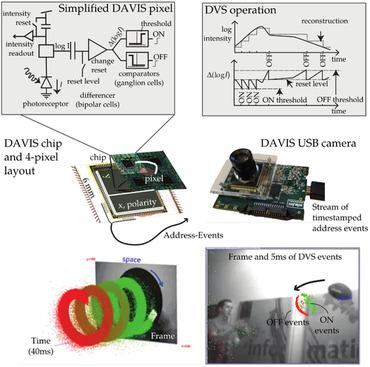Search Results for author: Saeed Afshar
Found 14 papers, 3 papers with code
A Neuromorphic Architecture for Reinforcement Learning from Real-Valued Observations
no code implementations • 6 Jul 2023 • Sergio F. Chevtchenko, Yeshwanth Bethi, Teresa B. Ludermir, Saeed Afshar
Reinforcement Learning (RL) provides a powerful framework for decision-making in complex environments.
Efficient Implementation of a Multi-Layer Gradient-Free Online-Trainable Spiking Neural Network on FPGA
no code implementations • 31 May 2023 • Ali Mehrabi, Yeshwanth Bethi, André van Schaik, Andrew Wabnitz, Saeed Afshar
This paper presents an efficient hardware implementation of the recently proposed Optimized Deep Event-driven Spiking Neural Network Architecture (ODESA).
Density Invariant Contrast Maximization for Neuromorphic Earth Observations
1 code implementation • 27 Apr 2023 • Sami Arja, Alexandre Marcireau, Richard L. Balthazor, Matthew G. McHarg, Saeed Afshar, Gregory Cohen
This is to ensure that the contrast is only high around the correct motion parameters.
Event-driven Spectrotemporal Feature Extraction and Classification using a Silicon Cochlea Model
no code implementations • 14 Dec 2022 • Ying Xu, Samalika Perera, Yeshwanth Bethi, Saeed Afshar, André van Schaik
This paper presents a reconfigurable digital implementation of an event-based binaural cochlear system on a Field Programmable Gate Array (FPGA).
Astrometric Calibration and Source Characterisation of the Latest Generation Neuromorphic Event-based Cameras for Space Imaging
1 code implementation • 17 Nov 2022 • Nicholas Owen Ralph, Alexandre Marcireau, Saeed Afshar, Nicholas Tothill, André van Schaik, Gregory Cohen
These techniques are vital in building event-based space imaging systems capable of real-world space situational awareness tasks.
An optimised deep spiking neural network architecture without gradients
no code implementations • 27 Sep 2021 • Yeshwanth Bethi, Ying Xu, Gregory Cohen, Andre van Schaik, Saeed Afshar
Through the use of simple local adaptive selection thresholds at each node, the network rapidly learns to appropriately allocate its neuronal resources at each layer for any given problem without using a real-valued error measure.
Event-based Object Detection and Tracking for Space Situational Awareness
no code implementations • 20 Nov 2019 • Saeed Afshar, Andrew P Nicholson, Andre van Schaik, Gregory Cohen
In this work, we present optical space imaging using an unconventional yet promising class of imaging devices known as neuromorphic event-based sensors.
Event-based Feature Extraction Using Adaptive Selection Thresholds
no code implementations • 18 Jul 2019 • Saeed Afshar, Ying Xu, Jonathan Tapson, André van Schaik, Gregory Cohen
A novel heuristic method for network size selection is proposed which makes use of noise events and their feature representations.
EMNIST: an extension of MNIST to handwritten letters
31 code implementations • 17 Feb 2017 • Gregory Cohen, Saeed Afshar, Jonathan Tapson, André van Schaik
The MNIST dataset has become a standard benchmark for learning, classification and computer vision systems.
 Ranked #6 on
Image Classification
on EMNIST-Digits
Ranked #6 on
Image Classification
on EMNIST-Digits
Investigation of event-based memory surfaces for high-speed tracking, unsupervised feature extraction and object recognition
no code implementations • 14 Mar 2016 • Saeed Afshar, Gregory Cohen, Tara Julia Hamilton, Jonathan Tapson, Andre van Schaik
This variance motivated the investigation of event-based decaying memory surfaces in comparison to time-based decaying memory surfaces to capture the temporal aspect of the event-based data.
An Online Learning Algorithm for Neuromorphic Hardware Implementation
no code implementations • 11 May 2015 • Chetan Singh Thakur, Runchun Wang, Saeed Afshar, Gregory Cohen, Tara Julia Hamilton, Jonathan Tapson, Andre van Schaik
We propose a sign-based online learning (SOL) algorithm for a neuromorphic hardware framework called Trainable Analogue Block (TAB).
Turn Down that Noise: Synaptic Encoding of Afferent SNR in a Single Spiking Neuron
no code implementations • 11 Nov 2014 • Saeed Afshar, Libin George, Jonathan Tapson, Andre van Schaik, Philip de Chazal, Tara Julia Hamilton
We have added a simplified neuromorphic model of Spike Time Dependent Plasticity (STDP) to the Synapto-dendritic Kernel Adapting Neuron (SKAN).
Racing to Learn: Statistical Inference and Learning in a Single Spiking Neuron with Adaptive Kernels
no code implementations • 6 Aug 2014 • Saeed Afshar, Libin George, Jonathan Tapson, Andre van Schaik, Tara Julia Hamilton
This paper describes the Synapto-dendritic Kernel Adapting Neuron (SKAN), a simple spiking neuron model that performs statistical inference and unsupervised learning of spatiotemporal spike patterns.
The Ripple Pond: Enabling Spiking Networks to See
no code implementations • 13 Jun 2013 • Saeed Afshar, Gregory Cohen, Runchun Wang, Andre van Schaik, Jonathan Tapson, Torsten Lehmann, Tara Julia Hamilton
In this paper we present the biologically inspired Ripple Pond Network (RPN), a simply connected spiking neural network that, operating together with recently proposed PolyChronous Networks (PCN), enables rapid, unsupervised, scale and rotation invariant object recognition using efficient spatio-temporal spike coding.





